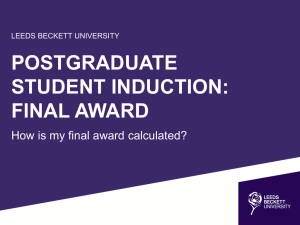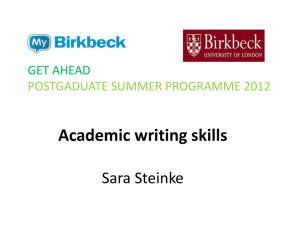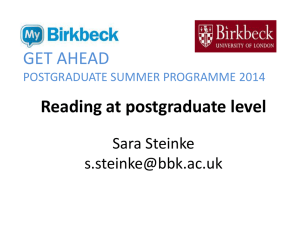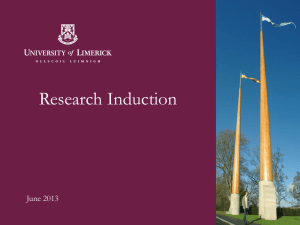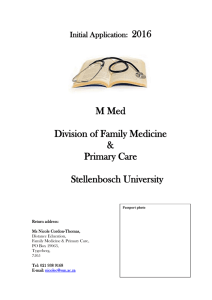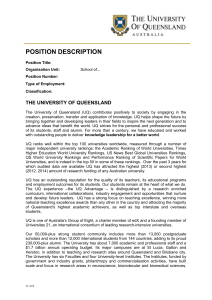CoP_teaching - University of Leeds
advertisement
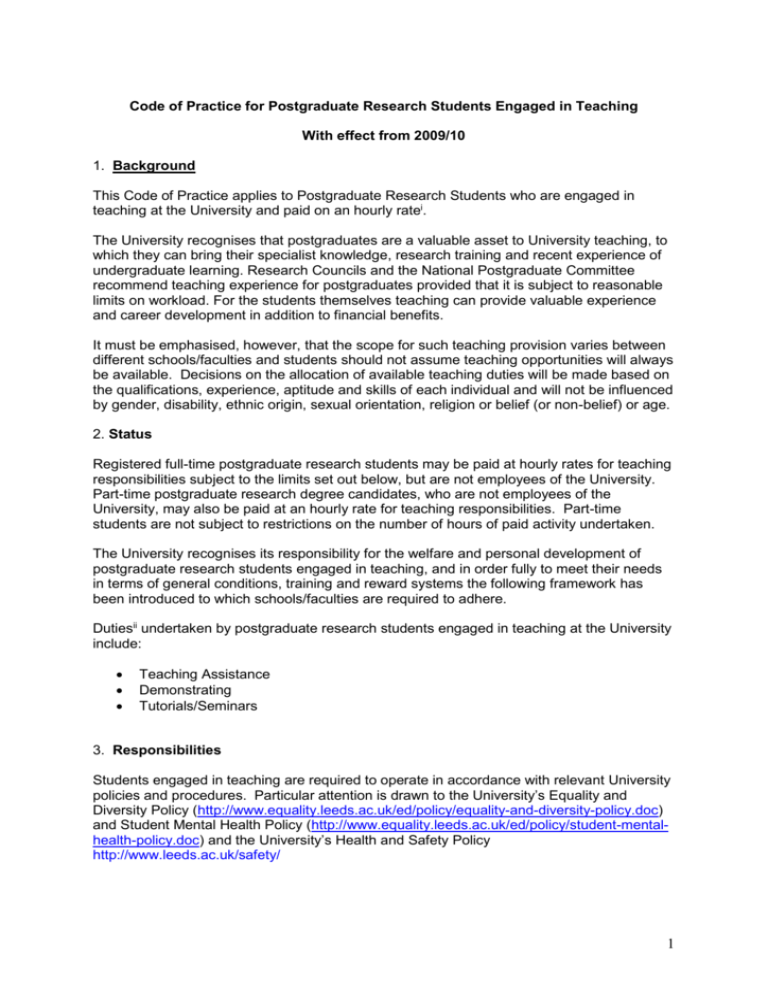
Code of Practice for Postgraduate Research Students Engaged in Teaching With effect from 2009/10 1. Background This Code of Practice applies to Postgraduate Research Students who are engaged in teaching at the University and paid on an hourly ratei. The University recognises that postgraduates are a valuable asset to University teaching, to which they can bring their specialist knowledge, research training and recent experience of undergraduate learning. Research Councils and the National Postgraduate Committee recommend teaching experience for postgraduates provided that it is subject to reasonable limits on workload. For the students themselves teaching can provide valuable experience and career development in addition to financial benefits. It must be emphasised, however, that the scope for such teaching provision varies between different schools/faculties and students should not assume teaching opportunities will always be available. Decisions on the allocation of available teaching duties will be made based on the qualifications, experience, aptitude and skills of each individual and will not be influenced by gender, disability, ethnic origin, sexual orientation, religion or belief (or non-belief) or age. 2. Status Registered full-time postgraduate research students may be paid at hourly rates for teaching responsibilities subject to the limits set out below, but are not employees of the University. Part-time postgraduate research degree candidates, who are not employees of the University, may also be paid at an hourly rate for teaching responsibilities. Part-time students are not subject to restrictions on the number of hours of paid activity undertaken. The University recognises its responsibility for the welfare and personal development of postgraduate research students engaged in teaching, and in order fully to meet their needs in terms of general conditions, training and reward systems the following framework has been introduced to which schools/faculties are required to adhere. Dutiesii undertaken by postgraduate research students engaged in teaching at the University include: Teaching Assistance Demonstrating Tutorials/Seminars 3. Responsibilities Students engaged in teaching are required to operate in accordance with relevant University policies and procedures. Particular attention is drawn to the University’s Equality and Diversity Policy (http://www.equality.leeds.ac.uk/ed/policy/equality-and-diversity-policy.doc) and Student Mental Health Policy (http://www.equality.leeds.ac.uk/ed/policy/student-mentalhealth-policy.doc) and the University’s Health and Safety Policy http://www.leeds.ac.uk/safety/ 1 4. Payment The University has standard hourly rates of pay for postgraduate research students engaged in teaching. Payments will normally be made on a monthly basis. The payment rates are displayed on the HR website at http://www.leeds.ac.uk/hr/progression/index.htm. The rates are payable for each contact hour and take account of any necessary time for preparation and assessment. Schools/Faculties are required to pay postgraduate research students, who are participating in training that is identified by the Faculty/School as necessary, at half the hourly rate for demonstrating and tutorial assistance. Generic job descriptions and person specifications are available from Human Resources. 5. Hours of work All full-time postgraduate students at the University are subject to a limit of 250 hours of paid activities per session associated with teaching or the equivalent in professional practice. A session is a period of 12 months from 01 September – 31 August. The limit of 250 hours includes preparation, marking, and other paid activity directly related to their training or related professional activity. It is felt that further commitments would interfere with an individual’s studies. The University, within the 250 hours of paid activity per session, will include the other paid duties undertaken by postgraduate research students described in section 2 above. (i) (ii) It is recognised that some full-time students may need to work in order to survive financially and a more flexible approach may be considered in these cases. Full-time students who wish to undertake paid activities beyond 250 hours should discuss with their supervisor whether any teaching or other work undertaken will adversely affect the time available for the conduct of the research. The Dean of the Faculty/Head of Schooliii is responsible for considering and granting approval for such cases. He or she must also ensure that the decision is recorded and that the situation is closely monitored to ensure that there is no adverse academic impact on the progress of the student’s research degree studies. Students should note, however, that some sponsoring bodies (including Research Councils, Charities and other Sponsors) may impose a lower limit for paid activities per session. All students funded by such bodies are required to observe the limits imposed. Part-time students are not subject to restrictions imposed by the University on the number of hours of paid work undertaken but the Dean of the Faculty/Head of Schooliii has responsibility for ensuring guidance is given on the amount of time that should be devoted to their research degree studies 6. Notification of Terms of Engagement and Payment Arrangements 6.1 All postgraduates involved in demonstrating and tutorial assistance will be asked by the Faculty/School in which they will provide these duties to complete a document (currently called the ‘Registration form and statement of the terms under which Demonstrating and Tutorial Assistance is to be provided’). Students may register to undertake demonstrating and tutorial assistance for an initial period of three years. The form asks for personal details, which form the basis of their record on the payroll. The Dean of the Faculty/Head of Schooliii completes details of the type and level of teaching or demonstrating, the rate of pay and the maximum numbers of hours that the student has been allocated during the academic year. The form is returned to the student as a record for him/her to keep. Payment will be made 2 after the Faculty/School in which the teaching is carried out provides the Payroll Office with details of the exact number of hours to be paid. Payments will be made on a monthly basis. 6.2 Postgraduate students providing teaching assistance should complete the ‘Registration form and statement of the terms of reference under which teaching assistance is provided’. Students may only register for teaching assistance for the periods in which such duties have been allocated by the relevant Faculty/School. 6.3 The Registration Forms set out the terms and conditions under which the postgraduate research student will provide teaching. 7. International (Non-EEA) Students Nationals of countries outside the European Economic Areaiv who are studying at UK institutions with student visas are usually permitted to work up to twenty hours per week during term-time (and more during vacations or work placements that are part of their studies). The policy of the Graduate Board, however, is that there is a limit of 250 hours of paid University-based activities per session for full-time research students to allow individuals to concentrate on their studies. The exception is the overtime period, when it may be permissible, in special cases, for international students to work up to a maximum of twenty hours per week. 8. Selection for and Allocation of Teaching Teaching is to be undertaken by postgraduates on a voluntary basis only and students should not be made to feel pressurised into taking on unwelcome teaching commitments. It must be stressed, however, that the scope for such opportunities varies between different schools/faculties and students should not assume teaching opportunities will always be available. All eligible postgraduate research students will be given the opportunity to express an interest in teaching. The Dean of the Faculty/Head of Schooliii must ensure that opportunities are distributed fairly and with due regard to the qualifications, experience, aptitude and skills of each individual. The overriding factor however is to ensure the quality of the teaching made available to the receiving students. The student’s supervisor will be given the opportunity to comment on the appropriate stage for a candidate to undertake teaching duties and on the potential impact on the progress of their research degree studies. However, responsibility for the decision on allocating teaching duties rests with the Dean of the Faculty/Head of Schooliii. The process adopted by the Faculty/School should be transparent and ensure equality of access and opportunity. Reasonable adjustments should be made for disabled students.v Each Faculty/School should have a member of staff with responsibility for the coordination and monitoring of the quality of the teaching undertaken by postgraduate research students. In particular, care will be taken to bring to the attention of the research student undertaking such teaching, any reasonable adjustment identified as part of an assessment of need for disabled students. 9. Training The University requires that all postgraduates with teaching responsibilities receive training and guidance. It is the responsibility of the relevant schools/faculties to ensure that training is provided. Some schools/faculties provide appropriate training and the Staff and Departmental Development Unit (SDDU) also runs a central programme of workshops for postgraduates who teach. Participation in SDDU training for teaching is strongly 3 recommended for postgraduates with limited teaching experience. Equally significant is the training and on-going guidance received in the Faculty/School. Postgraduates must: receive an induction into teaching in their Faculty/School; receive training in Health and Safety procedures; be fully informed of all risks and controls required as an outcome of any risk assessments; receive training in the use of any special equipment required for demonstrating or other techniques specific to the Faculty/School; receive all information for the module(s) on which they are teaching – module materials, handouts, etc. be assigned a mentor with whom they should meet regularly to discuss their specific teaching duties and responsibilities, the modules within which their teaching takes place, their progress and any problems and marking conventions within the Faculty/School; be encouraged to meet together in the Faculty/School to share ideas, resources and concerns. Appropriate issues arising should be considered by the Faculty/School learning and teaching committee; be kept informed about relevant administrative procedures, e.g. plagiarism and cheating, late or non-submission of work, attendance at classes; be advised of any reasonable adjustments identified as part of an assessment of need for a disabled student that they will be engaged in teaching; receive constructive feedback on their performance from the module manager or another member of the academic staffvi; receive appropriate assessment training where postgraduate research students are involved in assessment. In addition any teaching undertaken by postgraduates should be included in module/programme review. 10. Module Design Module design should remain the responsibility of academic staff. It is not expected that postgraduates paid on an hourly basis will be involved in module design. However, postgraduates who teach should be involved in programme and module review by being invited to report back on the structure, level and content of modules on which they teach. 11. Marking Schools/Faculties are required to give careful consideration as to whether or not postgraduates should be involved in marking and assessment. Adequate guidance, including clear criteria and marking schemes where appropriate, should be made available to the postgraduate, and their marking must be comprehensively monitored and moderated. Assessment design must remain the responsibility of the Module Manager. Postgraduate Demonstrators and Tutorial/Teaching Assistants may be involved in assisting academic staff in the design of assessments; such duties should be carried out under close supervision and guidance from the member of staff involved. 4 12. Accommodation and Resources It is expected that adequate accommodation, equipment and facilities such as photocopiers will be made available to postgraduates. Many postgraduates are allocated desks in shared offices, and where postgraduates are required to carry out individual tuition suitable accommodation should be made available for this purpose. 13. Faculty/School Support Schools/Faculties are required to organise support for postgraduates with teaching responsibilities by the following means: the nomination of a member of staff who will co-ordinate postgraduate teaching within the Faculty/School assignment of a mentor to each postgraduate involved in teaching, demonstrating and tutorial work and assessment peer support mechanisms such as regular meetings of postgraduates to pool ideas, discuss teaching methods, problems and solutions. (A member of staff could be present at such meetings to offer advice and facilitate feedback.) 14. Procedures for Evaluation and Review There should be clear and regular procedures within schools/faculties for the evaluation and review of the performance and role of postgraduate research students who teach. The University will only continue to employ postgraduate students when their performance is judged to be satisfactory. The University of Leeds also has a Code of Practice for Postgraduate Teaching Assistants (Part-time Students who are also Part-time Junior Members of Teaching Staff). This Code of Practice is available at www.hr.leeds.ac.uk/policies/UploadedFiles/Teaching%20Assistants%20%Teaching%20Assistance.doc JYF/ST/rdscommo/sarah/gradboard/sess06/review of cop for students engaged in teaching/final copy of code EXT 35778 25/06/08 i In exceptional circumstances, approved by the relevant Faculty Pro-Dean for Learning and Teaching, students studying for taught Masters’ degrees (with appropriate relevant experience) may be recommended to provide teaching. For those taught postgraduate students engaged in teaching the principles and arrangements set out in this Code will apply. ii Other duties that may be undertaken by postgraduate research students include: Oversight of the computer facilities available at the University Supervision of laboratory facilities (out of hours) Bookshelving in the University library Invigilation and other related duties during examinations Other duties may be added from time to time. iii or individual to whom responsibility has been delegated Details of those countries within the European Economic Area can be found at http://www.ukcisa.org.uk/student/eea.php v The Equality Service provides guidance and advice to staff and students (www.equality.leeds.ac.uk) vi The feedback provided should be recorded. iv 5
